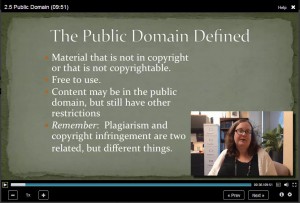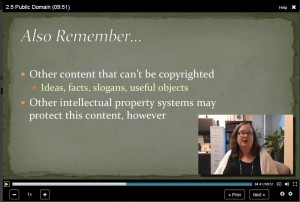 Images from Anne Gilliland's lecture "Public Domain," part of the "Copyright for Educators and Librarians" course at Duke University
Images from Anne Gilliland's lecture "Public Domain," part of the "Copyright for Educators and Librarians" course at Duke University
In this information age, many of us worry about others sharing pieces we have written, scanned, or recorded. What we may not consider, but should, is whether we ourselves have the right to use, donate, or sell certain items.
Recently, I participated in a four-week online course on copyright (for teachers and librarians) via Duke University. Meanwhile, my colleague Sally Benny attended a two-day education session during the Society of American Archivists (SAA) conference in Washington, D.C. Admittedly, neither of us expected the topic of copyright to hold much interest, but we rightly predicted the value of the information. It turns out that the basics of U.S. copyright law hold implications we had not realized.
Generally, “original works of authorship fixed in any tangible medium of expression” are protected by copyright. Holding copyright ownership means that you have the exclusive right to copy, make derivatives, distribute, perform, and display the work. Of interest to me was the fact that ideas, facts, and discoveries (among other things) are not copyrightable.
 With genealogy being so fact-driven, what does that mean for us? Essentially, when I write, “John Adams married in Weymouth, 25 October 1764, Abigail Smith,” I do not own that information; anyone can use it. However, if I compose a biography with (what my instructors called) “a spark of human creativity,” I could own copyright on the work as a whole. The individual fact would still be public, but if someone copied enough of my text, legally I could pursue compensation.
With genealogy being so fact-driven, what does that mean for us? Essentially, when I write, “John Adams married in Weymouth, 25 October 1764, Abigail Smith,” I do not own that information; anyone can use it. However, if I compose a biography with (what my instructors called) “a spark of human creativity,” I could own copyright on the work as a whole. The individual fact would still be public, but if someone copied enough of my text, legally I could pursue compensation.
Another angle to consider is that of physical versus intellectual ownership. Sally found this concept especially important concerning manuscripts. The donors often sign over both forms of ownership so NEHGS can display and even digitize the collection. Sometimes, the donors do not realize that they may not actually have the right to do so. Just because someone owns an item (like a manuscript), it doesn’t mean that person owns the copyright. The owner of the copyright is usually the author(s), heir(s), or employer(s) (in works for hire). That copyright ordinarily remains long after the death of the author. Currently, all unpublished works created before 1894 and works published before 1923 have entered into public domain and are free of copyright. Later works usually require permissions from the copyright owners or exceptions to copyright law.
Our classes emphasized using a framework to analyze whether a work is protected by copyright, and if so, whether that work can still be reproduced and/or distributed. I encourage everyone to carefully consider copyright when using materials you didn’t create or when making available those you created.
Share this:
About Kyle Hurst
Kyle, Genealogist of the Newbury Street Press, holds a B.A. in both history and anthropology from the University of Wisconsin in Madison and has a master’s certificate in Museum Studies from Tufts University. With experience at the National Archives and Record Administration in Waltham, Kyle has worked on a wide variety of research projects as part of the Research Services team at NEHGS and, with Newbury Street Press, has contributed to a number of family histories. She has been credited for her contributions to The Root, TheRoot.com, and she has also written for American Ancestors magazine.View all posts by Kyle Hurst →